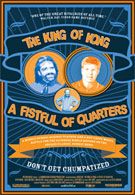In recent years documentaries have garnered acclaim while pointing out the shortcomings of governments, targeting questionable practices of corporations, or educating people about the migration habits of European swallows… or is that an African swallow? It doesn’t matter; the point is that all of these are documentaries taking place on a grand scale. But not every conflict has to involve large-scale enemies like this. The simplest conflicts are battles fought between two people, man against man. With this in mind, The King of Kong shows how the most epic of battles can take place between two people, over something as simple as a video game high score.
We’ve all played a game in an arcade and a few of us have even had the fortune to have one of our scores show up on that almighty scoreboard. I’ve probably had the honor of putting my initials on an arcade machine a dozen times, but I never considered how competitive people could be over those scores. I guess it makes sense. My ninth place score in Teenage Mutant Ninja Turtles knocks whoever was in tenth place off the list, so a little competitive spirit to keep a name on the list is only natural. Now take that one machine and increase the scale to a world-wide list, and the pressure to keep a name on top, and you have a sense of what The King of Kong is about.
The most competitive of these games are the most simplistic: Pac-Man, Centipede, Donkey Kong, you know, the classics. These games have been around the longest may be less complex, but become a test over basic video game skills: pattern recognition, timing, hand-eye coordination, and just a little bit of luck. Basic as it may be, somehow the national record score for Donkey Kong had been unchanged and unchallenged since the ‘80s. When Steve Wiebe found himself unemployed in 2003, he turned to Donkey Kong for comfort and set out to beat the store held by Billy Mitchell, a legend in competitive gaming organizations. What he didn’t count on was more than just a video game score, but also having to face personal vendettas, deal with favoritism, tolerate egos, and even have his personal credibility called on the line, forcing his submitted score to be negated. But if you can beat a score once, you can beat it a second time, right? That’s the battle The King of Kong captures on film, as Wiebe sets out not once, not twice, but three times to gain the high score on Donkey Kong and become a record holder.
The beauty of this man versus man competition comes from the two different types of people competing. Billy Mitchell is a “winner” personality. He’s very proud of his accomplishments, including his hot-sauce business and his Donkey Kong score. After listing his accomplishments he flat out tells the camera that with all of his blessings he’d hate to see the guy on the other side of the karmic coin. Wiebe certainly seems to be that person. Unemployed at the beginning of his Donkey Kong journey, Steve’s family talks about previous endeavors that were less successful for Wiebe, including a key state-level baseball game he couldn’t play in due to an injury, and an unsuccessful attempt at a musical career. The competitor breaks into tears more than once during his quest. The depiction of each person feels very honest, with both strengths and weaknesses being exposed and a conflict coming merely from their personalities, rather than an editor’s hand.
Despite an at-times-unflattering portrayal of these players (who sometimes appear to be the types who are far too old to still live in their mother’s basements), it’s hard not to get caught up in the competitive spirit, even over something as simple as Donkey Kong. By the end you can’t help rooting for Wiebe to get that top score. Not because he deserves it more than Mitchell (although Mitchell refuses to actually play throughout the documentary), but because he’s worked so hard for it and because the documentary makes it clear how much he wants it. Wiebe is the kind of hero we expect from fictional stories – a virtual Rocky who has been beaten down but keeps coming back for more – but alive and in the flesh.
The King of Kong is an incredibly compelling documentary that doesn’t rely on controversial subject material or fancy editing and storytelling to win over an audience. It’s a nice reminder that you don’t need flash and dazzle to win an audience and a video game score can be just as captivating as any other conflict out there. Take an evening off from governmental debate, explosive car chases, and high drama and enjoy The King of Kong, a thoroughly enjoyable documentary.
Most Popular




